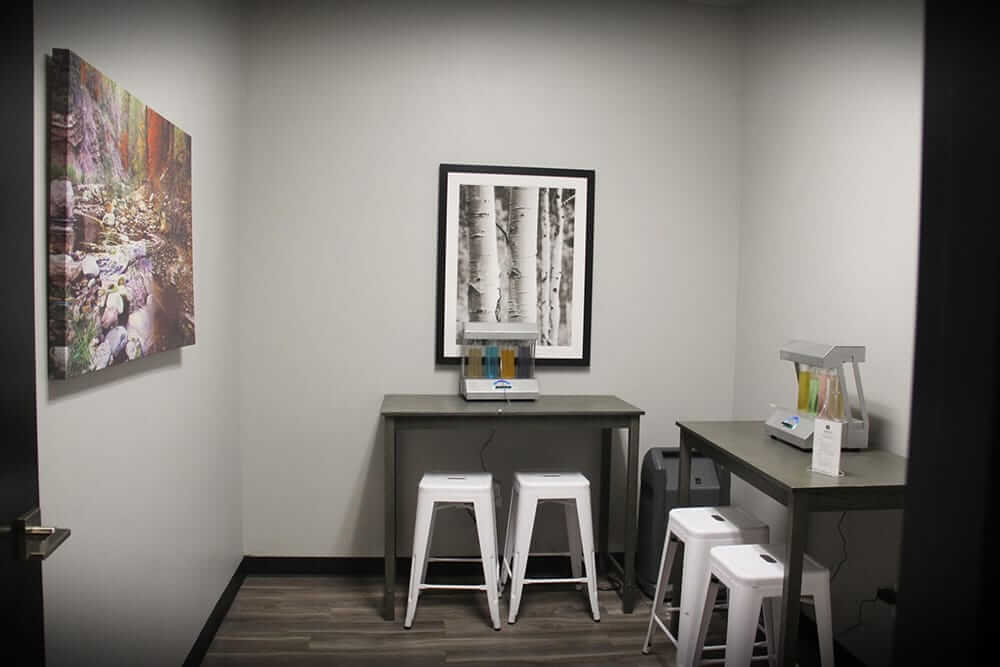Written by Brandon Okey. Mina Draskovic, B.Psy., reviewed this content for accuracy.
Women with fibroids often notice changes in their bleeding patterns after drinking. Even small amounts of alcohol can trigger heavier bleeding or unexpected bleeding episodes, especially during menstruation.
A 2020 review suggests higher risks of alcohol-related reproductive health problems in women. Alcohol triggers fibroid growth and makes them bleed by altering hormone levels, blood vessel formation, and inflammatory responses.
Ardu specializes in treating women with alcohol use disorders (AUDs) while addressing their unique health concerns such as uterine fibroids. Our women-oriented alcohol rehab center provides comprehensive care that combines alcohol recovery with women’s health treatment in a safe, restorative setting.
Fibroids are noncancerous muscle and fibrous tissue growths in or around the uterus. They range in size from microscopic to several inches in diameter and can significantly affect the uterus’s shape and size. These growths respond to hormones, particularly estrogen and progesterone, which influence their development and growth patterns.
Fibroids can grow within the uterine wall (intramural), beneath the inner lining (submucosal), or on the outer surface (subserosal). Some women with fibroids have no symptoms at all, but others may experience:
The exact cause of fibroids is unclear, but genetic predisposition, hormonal factors, and certain lifestyle elements are known fibroid risk factors.
Fibroids can affect fertility and pregnancy. Some interfere with conception or increase pregnancy complications, while others have no effect at all. As fibroids develop, they can cause bleeding.
Fibroids cause bleeding by altering the uterus’s blood supply and changing its normal menstrual process. The increased size of blood vessels around fibroids and changes in the uterine lining lead to heavier and sometimes unpredictable bleeding.
Here are the main triggers of bleeding fibroids:
Many women notice that alcohol consumption intensifies their fibroid bleeding, especially during menstruation. Even small amounts of alcohol can trigger heavier bleeding episodes.
If you’ve noticed that alcohol triggers your fibroid bleeding but find it difficult to stop drinking, Ardu’s alcohol rehab center offers support for women struggling with alcohol use disorder (AUD). Our treatment programs address alcohol recovery and the negative effects of alcohol on women’s health, so we can provide personalized medical support and strategies to help you manage your recovery while improving your overall health.
Alcohol has a complex and significant impact on fibroids that goes far beyond simple symptom changes. Because fibroids are hormone-sensitive tumors with their blood supply, alcohol affects them through multiple biological mechanisms.
Many people turn to alcohol to manage physical or emotional pain, creating a cycle where drinking worsens the very problems they’re trying to solve. Our dual diagnosis treatment addresses alcohol dependency and underlying health conditions for a lasting recovery.
If you notice signs of alcohol dependency in yourself, reach out to Ardu.
When fibroids begin to shrink, whether through treatment, menopause, or natural regression, you may experience:
Fibroids rarely “dissolve” on their own. They shrink gradually, especially after menopause when hormone levels drop. If you notice any sudden changes in your symptoms, contact your healthcare provider for an evaluation.
When you quit drinking, many reproductive health issues improve, especially problems such as fibroids that depend on hormone balance. Here’s how your fibroids may improve when you quit alcohol:
Your body begins healing when you quit alcohol. If you want to improve your reproductive health and reduce fibroid symptoms, Ardu Recovery Center’s medical team provides safe, supervised alcohol detox to help you start your recovery.








Alcohol affects many aspects of women’s health, from hormone balance to mental well-being. Our specialized treatment approach focuses on helping your body heal from alcohol’s effects, particularly on reproductive and sexual health issues in both men and women.
Our evidence-based programs and personalized care plans include the following:
Beyond improving reproductive health, quitting alcohol with professional support can improve sleep, reduce anxiety, and promote liver function and hormone balance. Our medical detox team guides you through detox safely while monitoring your specific health concerns.
Take the first step toward better health today. Contact us to learn how our specialized women’s treatment program can help you recover your health and reduce alcohol’s impact on your body.

Brandon Okey is the co-founder of Ardu Recovery Center and is dedicated to empowering people on their journey to sobriety.
Alcohol directly impacts the uterus by increasing premenopausal estrogen levels and altering blood flow patterns. When you drink, alcohol raises estrogen in your bloodstream while dilating blood vessels in the uterine cavity. For women with uterine fibroids or uterine myomas, alcohol consumption worsens symptoms through multiple mechanisms:
The hormonal imbalance caused by alcohol can lead to heavier periods, abnormal uterine bleeding, and worsened quality of life for women with reproductive health issues. According to research, heavy drinking particularly affects black women, who already have a higher risk of fibroids.
Uterine fibroids can be significantly affected by different lifestyle factors and daily choices. For women with uterine myomas, the following habits and substances can trigger growth and worsen symptoms:
The relationship between alcohol and uterine health is complex, but research shows that drinking damages the uterine lining. For women with existing conditions such as uterine fibroids or uterine myomas, alcohol’s effects can be particularly harmful.
Here’s how alcohol damages the uterine lining:
The good news is that when women stop drinking, many of these effects begin to reverse because the body starts to heal and hormone levels normalize.
Alcohol can trigger or intensify menstrual bleeding, even outside of a regular period. It disrupts hormonal balance by raising estrogen levels and acts as a blood thinner, which together can lead to excessive or abnormal bleeding. For women with conditions such as uterine fibroids or myomas, this risk is even greater since their uterine tissue is especially sensitive to hormonal shifts.
Lifestyle factors, such as poor diet combined with regular alcohol consumption, exacerbate symptoms, making bleeding more frequent and severe. Maintaining a diet rich in green vegetables and vitamin D can help balance hormones, potentially reducing these bleeding risks.
Spotting after drinking occurs due to alcohol’s effects on hormonal balance and uterine health. Heavy alcohol intake destabilizes the uterine lining through excess estrogen production and blood vessel changes. For women with uterine fibroids or uterine myomas, even moderate drinking can trigger abnormal bleeding. Lifestyle factors such as vitamin D deficiency and poor diet increase these risks. Both white women and Black women experience spotting, though risk factors vary. Systematic reviews show alcohol disrupts daily life through irregular bleeding patterns. A balanced diet rich in green vegetables helps maintain hormonal balance and reduces spotting risks.
Beer is particularly harmful for uterine fibroids and uterine myomas. Beer consumption has the strongest negative impact on the development of fibroids compared to other alcoholic beverages. Beer increases excess estrogen production more than other alcohol types, leading to faster growth of fibroids in women.
Beer consumption has been linked to increased inflammation in the body, which can worsen symptoms of fibroids such as pelvic pain and bloating. Women concerned about fibroids should focus on nutrient-rich diets and limit alcohol (especially beer since it exacerbates fibroid symptoms).
Women with fibroids are typically advised to avoid wine, as it raises estrogen levels and can aggravate fibroid symptoms and growth factors. All types of alcohol, including wine, disrupts hormonal balance, leading to heavier bleeding and increased discomfort. Instead, a healthy diet rich in green vegetables and sufficient vitamin D can support hormonal balance and improve the quality of life for those with fibroids.
Takala H, Yang Q, El Razek AMA, Ali M, Al-Hendy A. Alcohol Consumption and Risk of Uterine Fibroids. Curr Mol Med. 2020;20(4):247-258. doi: 10.2174/1566524019666191014170912. PMID: 31612831.
Chiaffarino, F., Cipriani, S., Ricci, E., Vecchia, C. L., Chiantera, V., Bulfoni, A., & Parazzini, F. (2017). Alcohol consumption and risk of uterine myoma: A systematic review and meta analysis. PLoS ONE, 12(11), e0188355. https://doi.org/10.1371/journal.pone.0188355
Wise, L. A., Palmer, J. R., Harlow, B. L., Spiegelman, D., Stewart, E. A., L., L., & Rosenberg, L. (2004). Risk of uterine leiomyomata in relation to tobacco, alcohol and caffeine consumption in the Black Women’s Health Study. Human Reproduction, 19(8), 1746-1754. https://doi.org/10.1093/humrep/deh309
Does quitting alcohol increase sex drive?
The link between alcohol and hypersexuality
How long does alcohol detox last?
Is there an alcoholic personality?
Can your liver heal when you quit drinking?
Can I take ibuprofen with alcohol?